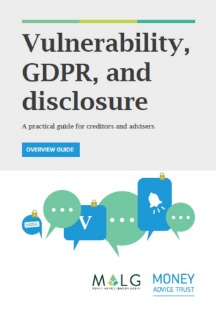Public sessions
Our public vulnerability courses cover a range of subjects to help staff develop the skills to identify, communicate and support customers in vulnerable circumstances.
Inclusive design is at the heart of regulatory supervision.
Of increasing importance in the conversations about vulnerability – inclusive design is the development of buildings, products, services, or processes that are accessible to all people, regardless of age, disability, or other factors.
Firms needs to be taking into account vulnerability throughout their design process, and mitigating any potential for harm.
This course will help you, and your teams, understand what inclusive design is and how you can use it when designing products and services.
“Inclusive design means designing services and products for everyone to participate in the experience with the same sense of belonging. It’s about understanding and empathising with customers, making sure none feels disadvantaged or left behind.”
– Angelica Nesi, Vulnerability and Design Lead, Money Advice Trust
Course overview
Course aim: This course will help you, and your teams, understand what inclusive design is and how you can use it when designing products and services.
Course outcomes – By the end of this course, learners will be able to:
- Define what inclusive design is and why it is important when designing products for customers
- Identify what good inclusive design looks like
- Apply inclusive design principles.
Who is it for? Product design and marketing teams, vulnerability specialists or anyone whose role involves championing the needs of customers in vulnerable circumstances.
Meet the trainer: Angelica Nesi

Angelica is a Service Designer passionate about Inclusive Design!
During her undergrad in Industrial Design, Angelica discovered her passion for observing and redesigning the customer experience, which led her to transition into Service Design. Throughout her academic years, Angelica developed an interest in understanding users in vulnerable circumstances, which drew her into the world of financial services and led her to work in the financial industry for a few years, focusing on inclusive design methodologies and user research.
Recently Angelica decided to pivot into the field of education, pushed by the vision of building students’ careers through a meaningful and inspiring educational experience.
Angelica’s collaboration with Money Advice Trust started a few years ago now, and she has been fortunate to have the opportunity to meet people from diverse backgrounds and organisations and encourage conversations around inclusion and accessibility as well as sharing tools and framework for applying inclusive design within their process.
Health, disability, unemployment, bereavement, domestic violence and addiction can all contribute to making someone more vulnerable.
Your staff need to know how to identify and work with these customers in a way that is both consistent and fair. This can have a positive impact on your ability to recover debts, employee morale and your reputation as a responsible organisation.
Our ‘Supporting customers in vulnerable circumstances’ virtual classroom will provide your staff the skills to identify a vulnerable customer, have a conversation to understand their vulnerability, take action and signpost to further support.
Supporting customers in vulnerable circumstances
Delivered online
13:30 – 17:00
Wed 18 September 2024
SECURE YOUR PLACE“The sessions have allowed our adviser teams to sit back and evaluate their approaches to vulnerability and resulted in them feeling empowered to suggest changes to our current processes.”
– Just Group plc
Course overview
Course aim: to provide learners with the skills required to identify, communicate, and support a vulnerable customer.
Course outcomes – By the end of this course, learners will be able to:
- Define what the term vulnerable consumer means
- Identify a vulnerable consumer, based on the information available at the time
- Identify and support a consumer with mental capacity limitations
- Apply conversational techniques to begin a conversation with a vulnerable consumer
- Apply conversational techniques to manage the disclosure of a vulnerable consumer and record the information compliantly with regulations
- Explain what support options are available to a vulnerable consumer.
Who is this for? All staff involved in identifying and talking to vulnerable customers.
Meet the trainer: Colin Trend

Colin Trend has a wealth of experience in the finance and debt sector; from private, public and voluntary sector roles. He has tutored with the Money Advice Trust since 2007 and works directly with many firms.
Colin is the lead tutor with the Money Advice Trust on our vulnerability programme, assisting both in the UK and overseas and has also written core vulnerability guidance, created industry-standard tools (including TEXAS), and co-hosts our Vulnerability Academy in partnership with UK Finance.
Research suggests that one in four front line collections staff report that they have spoken to at least one customer they believe might be at risk of suicide in the last 12 months – and yet many staff feel unsure about what do in these extremely difficult situations.
This is the only course of its kind for essential services, equipping front line staff with the skills and confidence to intervene. The focus is on immediate safety, not fixing problems or trying to deliver therapeutic interventions. The skills we teach can be mastered by anyone.
Suicide First Aid: Understanding suicide intervention for essential services
Delivered online
Mon 16 Sep 2024
9:00 – 13:00
SECURE YOUR PLACE

“I thought that this was the best piece of training that was provided by the bank for vulnerable customers. I think it will be something that would be beneficial to everyone in a customer facing role.”
– NatWest Group, Specialist Support Colleague
Course overview
Course aim: To provide staff with the knowledge and practice of suicide intervention skills, which can be applied in any essential services setting – financial, energy, water and telecommunications.
Course outcomes: By the end of this course, learners will be able to:
- Gain the skills, tools and confidence to help customers with feelings of suicide fairly and consistently
- Meet your legal and regulatory responsibilities
- Understand the impact and value of personal and professional experience with suicide
- Gain the skills to Identify, talk and keep customers and staff safe
- Understand barriers that prevent people at risk seeking help
- Understand when escalation to specialist staff/team managers and external agencies is required.
Who is it for? Front line staff, customer-facing staff, escalation points, team leaders.
Delivered by The National Centre for Suicide Prevention Education & Training
To help creditors and front line staff, The Money Advice Trust has partnered with the National Centre for Suicide Prevention Education and Training CIC, bringing together the Trust team’s expertise and long-running programme on vulnerability and the work of Nick Barnes on suicide prevention to help essential services support vulnerable customers with thoughts of suicide to stay safe, and to stay alive.

Data lies at the heart of the FCA’s vulnerability regulations.
Firms need to know their vulnerable consumers, hold the right data about them, and use this to help and support them. Firms also need to balance the FCA’s expectations on data with those of the ICO, the GDPR, and the Data Protection Act 2018.
This course has been developed to address these specific requirements and provide your firm with the knowledge to make sure you meet your responsibilities.
Data, GDPR and vulnerability
Delivered online
Thu 19 Sep, Fri 21 Sep & Thu 26th Sep 2024
09:30-13:00
SECURE YOUR PLACE“A firm’s purpose for processing explains their need to record vulnerability data, and their practical plan for achieving this. It is developed using the guiding lenses of data protection, vulnerability regulation, and operational practicality. Together we’ll explore how to comply with data protection law and regulation, meet vulnerable customers’ needs, while keeping things simple for staff.”
– Robert Bell, Data & GDPR Consultant, Money Advice Trust
Course overview
Course aim: The aim of this course is to provide learners with knowledge to understand how GDPR and vulnerability interact and how to record the required information for vulnerable customers.
Course outcomes – By the end of this course, learners will be able to:
- Identify the challenges of supporting vulnerable customers and meeting GDPR requirements
- Explain the different basis under articles 6 and 9 that can be used to record customer disclosures
- Apply the principles from GDPR to a range of vulnerable customer scenarios.
Who is it for? Data protection teams, staff working on vulnerability policy, operational and compliance leads/specialists.
Meet the trainer: Robert Bell Data & GDPR Consultant

Robert is a law graduate, specialising in EU law, who has worked in a range of compliance roles within the financial services industry. Recently he co-authored the Money Advice Trust and Money Advice Liaison Groups Guidance on Vulnerability, GDPR, and disclosure.

Creating effective and engaging communications with customers has never been more important. With the ongoing impact of the cost of living crisis, and the FCA’s Consumer Duty, it’s crucial to understand your customers, who could be facing a number of difficult circumstances and potentially be vulnerable.
This is where Behavioural Science can help. By exploring the different biases or mental shortcuts in people’s everyday decisions, this can help you to understand your customers, and create fluent communications to drive sustained engagement. Using Behavioural Science, making small changes enables you to have a big impact and deliver good outcomes for your customers.
Consumer Duty in action: using behavioural science to communicate with vulnerable customers
Delivered online
Register your interest in future sessions
Our session will be run in collaboration with Cowry Consulting, one of the largest award-winning behavioural science consulting firms in the industry. Working with clients such as Tesco, HSBC, Standard Life and Quilter, they specialise in understanding the academic literature, and applying it in businesses to create better customer and employee experiences and outcomes.
Course overview
Course aim: This 1-day course will give you the tools to start creating more compelling communications using behavioural science.
Course outcomes – By the end of this course, learners will be able to:
● Create communications which enable customers to make effective, timely and informed decisions
● Tailor channels of communication to consider a customer’s vulnerability, the complexity of the product, and the role of the firm to support customers.
● Understand key behavioural biases and how you can use them in an ethical and fair way.
Who is this for? Those responsible for ensuring that a product, service or process is delivering good customer outcomes.
Meet the trainers
Eoin Campbell, Experimental Design Manager
Eoin develops and applies inventive business solutions grounded in behavioural science to enhance customer experience. He’s experienced in utilising data to design more effective behavioural interventions, and creating opportunities for businesses to better support their customers with empathy and compassion.
Charlie Nixon, Senior Behavioural Architect
Charlie applies his knowledge and expertise in behavioural strategy, psychological principles and behavioural models to optimise customer and employee experiences. Charlie has a core interest in supporting vulnerable customers, working with clients in the Financial and Retail sectors.
With research showing that one in four adults will experience a mental health problem, creditors need to ensure they have the right systems, processes and staff training in place to help customers who may experience the challenges that poor mental health can bring.
Being aware of the range of mental health problems and their impact on a person’s ability to manage their finances is a vital part of understanding your customers and achieving the right outcomes for your organisation, key expectations of the Financial Conduct Authority.
Supporting customers with mental health conditions
Delivered online
REGISTER YOUR INTEREST IN FUTURE SESSIONS
Course overview
Course aim: The aim of this course is to provide learners with the skills required to communicate with and support a vulnerable customer with a mental health condition effectively.
Course outcomes – By the end of this course, learners will be able to:
- Identify the challenges customers with mental health problems may face in their day-to-day life
- Identify the impact of not supporting customers with mental health problems can have on their firm and colleagues
- Apply conversational techniques to have a conversation with customers with mental health problems
- Apply conversational techniques to manage the disclosure of a mental health problem
- Explain what support options are available to a customer with mental health problems.
Who is this for? All front-line, customer-facing staff, management, specialist teams, back-office staff and relevant suppliers.
Meet the expert: Zoe Medlock, Vulnerability Consultant
Zoe Medlock is an expert in consumer vulnerability strategy and implementation. Zoe specialises in mental health and works with the Money and Mental Health Institute to assess firms against their Mental Health Accessible Standard.
Prior to this, Zoe was involved in leading the team responsible for developing and delivering a leading UK bank’s vulnerability strategy.
The Financial Conduct Authority expects you to be able to evidence that your outcomes for vulnerable customers are as good as those of other customers. You need to show how good outcomes result from all of the efforts and activities that are in place, and in particular that you are preventing avoidable harms.
So, what is a ‘good outcome’ and how do we decide which outcomes we need to monitor? Why do they matter so much when it comes to vulnerability? And, how do firms go about doing all of this?
If you are responsible for ensuring that a product, service or process is delivering good customer outcomes then our training session can help.
Consumer outcomes: development and measurement
Delivered online
09:00 am – 1pm
Tue 24 September 2024
SECURE YOUR PLACE“It is clear that outcomes matter, but how do you know which outcomes matter most and how to monitor if those outcomes are good enough? This course will equip all participants with a structured and repeatable process to design, develop, deliver and embed great outcomes monitoring within a firm and to be able to evidence when good outcomes are being consistently achieved.”
Tim Hawley, Vulnerability Consultant, Money Advice Trust
Course overview
Course aim: to provide learners with a systematic process that enables you to identify, measure, monitor and evidence how well your organisation is achieving good outcomes, tailored towards the specific products and services that your organisation provides.
Course outcomes – By the end of this course, learners will be able to:
- Assess their current firms’ approach towards outcome monitoring and setup new outcome monitoring that prevent harms occurring
- Understand regulatory expectations for good outcomes
- Design an effective Management Information system (MI)
- Understand how to choose appropriate outcome measures for your firm
- Apply principles of good MI.
Who is this for? Those responsible for ensuring that a product, service or process is delivering good customer outcomes.
Meet the trainers: Tim Hawley & Lucy Holland
Tim Hawley is a Vulnerability Consultant at the Money Advice Trust. He has over 17 years of financial service experience, most recently leading a multiple award winning vulnerability program as Director of Consumer Vulnerability at Capital One. Tim now supports others on that journey through training and consultancy with the Money Advice Trust.
Lucy is a vulnerability consultant who has worked in Financial Services for over 20 years, primarily within the underserved sector. She specialises in Customer Advocacy and Product Design with a particular focus on Compliance and Regulation. She has also built and trained Operations and Product teams across a number of businesses.
Front line creditor staff continue to be presented with difficult situations in supporting customers across the whole range of vulnerable circumstances that people experience. The cumulative effect of dealing with these challenges – particularly during the Covid-19 outbreak – can impact staff wellbeing both emotionally and professionally.
Building resilience helps us to stay safe, well and effective in our roles. To help the credit industry as it seeks to improve resilience in every workplace, we are holding a public session of our new remote learning course, building personal resilience to help you to support your staff.
Building personal resilience
Delivered online
09.30 am – 1 pm
Tue 17 September 2024
Secure your place“The better we become at creating environments where our customers feel more comfortable telling us what is going on in their lives, the more we are exposed to information and situations that can be difficult to hear. Covid-19 has meant that many of us may be going through similar challenges as our customers. We wanted to create a course that helps colleagues to keep well while helping others.”
– Caroline Wells, Customer Experience Expert, Money Advice Trust
Course overview
Course aim: The aim of this course is to provide staff with an insight into what affects their resilience and the practical steps they can take to support their own wellbeing.
Course outcomes – By the end of this course, learners will be able to:
- Understand why people react the way they do when they are under stress and strain
- Identify and explore their personal boundaries and triggers
- Identify practical steps to take when they are in ‘the moment’
- Understand the steps to take to look after themselves both during and after an interaction with a vulnerable customer
- Identify what environmental factors they can influence and change for the better.
Who is it for? All front line, customer-facing staff, management, specialist teams, back-office staff and relevant suppliers.
Meet the trainer: Caroline Wells Customer Experience Expert

Developed by the Money Advice Trust’s customer experience expert Caroline Wells, this course aims to provide staff with the practical tools needed to maintain resilience through challenging times, help staff to prepare for situations as they arise and the uncertainty customers may face as a result of potentially difficult situations.
As a pioneer of accessible and inclusive customer service, Caroline has worked with people in and around financial services for over 25 years. Caroline has influenced positive change that optimises the needs of disabled people and vulnerable customers.
People living with any dependency – be it gambling, alcohol or substance misuse – can have complex and difficult lives. This can easily lead to financial detriment, including over-spending, losing control and difficulty managing their finances.
Recent research shows that one in four frontline creditor staff find it difficult to talk about the issue of ‘dependency’ with customers – more than any other type of vulnerable situation.
With one in four specialist staff and one in ten frontline staff encountering customers with a dependency ‘most days’ or ‘every day’ it is vital staff are able to understand, identify and support customers suffering from a dependency.
Supporting customers with gambling, alcohol and substance dependency
Delivered online
Tues 17 Sep 2024
9:00 – 13:00
SECURE YOUR PLACE“In a typical month, a full-time adviser will encounter 7 clients who disclose a dependency issue. Empowering frontline workers begins with understanding. Our training course equips you to navigate the complexities of supporting vulnerable customers with dependency issues, fostering resilience, and creating pathways to other supports.
– Jamie Compton-Rea, Addiction and Suicide Prevention Expert, National Centre for Suicide Prevention Education and Training
Course overview
Course aim: The aim of this training is to provide Learners with the knowledge and skills needed to support a customer who is living with a dependency.
Course outcomes – By the end of this course, learners will be able to:
- Understand how dependency occurs.
- Have reflected on their values and attitudes.
- Understand how dependency can affect members.
- Be able to identify a member who may be affected by a dependency.
- Be able to effectively signpost a member for further support.
Who is it for? All frontline, customer-facing staff, management, specialist teams, back-office staff and relevant suppliers.
Meet the trainer: Jamie Compton-Rea

Born in Belfast, Northern Ireland, Jamie has over 15 years of experience in working in addiction and suicide prevention services. Currently working as the Chief Operations Officer for the National Centre for Suicide Prevention Education and Training, Jamie’s passion is in prevention and brief intervention around substance misuse and suicide.
Having qualified as an integrative therapist, Jamie has developed a compassionate and empathetic approach to working with vulnerable individuals, including those who have experienced trauma or other significant life challenges. Confident in his ability to communicate effectively with such individuals, helping them to feel heard, valued, and supported.
Training options
We can also deliver our training courses virtually in-house and via e-learning to staff. This can be tailored to your organisation’s needs and requirements, get in touch to find out more.
Have a question about our public sessions?
Complete our simple enquiry form to help us meet your needs and we will get back to you shortly.